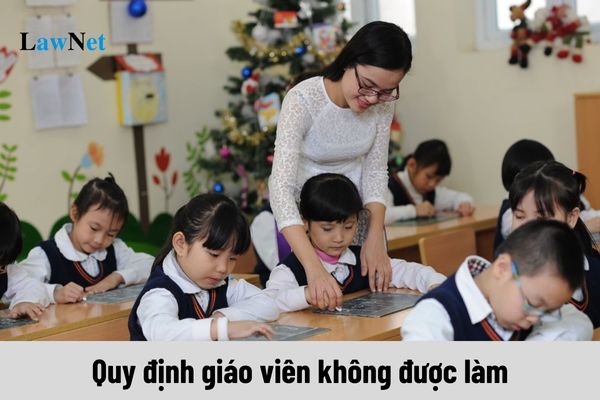Vietnam: 11 things that teachers must not do to preserve and uphold the ethical traditions of educators
11 things that teachers must not do to preserve and uphold the ethical traditions of educators
Pursuant to Article 6 of the Regulation on the teaching professional’s moral standards issued together with Decision 16/2008/QD-BGDDT of the Ministry of Education and Training of Vietnam, there are 11 specific prohibitions for teachers aimed at preserving and protecting the ethical traditions of educators as follows:
(1) Do not abuse authority and power to commit violations against laws, rules and regulations; do not obstruct or cause annoyance towards students and population.
(2) Do not commit fraudulent and dishonest acts during the process of learning, scientific research and conduct of teaching and educational activities.
(3) Do not favor or unfairly treat or take discriminatory measures against students; do not collude in or conceal negative actions that may arise during the process of teaching, learning and training undertaken by students and colleagues.
(4) Do not inflict damage on student’s body, hurt sense of honor and dignity of students, colleagues and others. Do not cause impact on work and life activities of colleagues and others.
(5) Do not organize extra classes which are inconsistent with laws and regulations.
(6) Do not smoke, drink beer and alcoholic beverage in workplaces, schools and other unauthorized areas or during the period of performing teaching duties and participating in educational activities.
(7) Do not use mobile phones and do private things during meetings on-class, learning, test proctoring and marking time.
(8) Do not lead factions, be of local prejudice and cause to destroy the unity among people in a collective and community life.
(9)Do not use teaching platforms as a place to disseminate and communicate information contrary to the views and policies of the Communist Party and Government.
(10) Do not evade responsibilities and repudiate duties or deliberately cease tasks without permission; do not teach and finish classes respectively later and earlier than scheduled class time, or discretionarily cancel classes or course credits, cut down and shorten the time to complete an educational program, commit professional rules which can deteriorate the discipline and order of a school.
(11) Do not organize or get involved in activities relating to social evils such as illegal gambling, prostitution, narcotic abuse and superstitious customs; do not use, store and disseminate depraved and toxic cultural products.

11 things that teachers must not do to preserve and uphold the ethical traditions of educators (Image from the Internet)
Regulations on professional ethics for teachers as prescribed by the Ministry of Education and Training
According to Article 4 of the Regulation on the teaching professional’s moral standards issued together with Decision 16/2008/QD-BGDDT, the professional ethics for teachers are as follows:
- Show devotion to their chosen profession, develop an awareness of protecting their honor and professional conscience; have the spirit of solidarity, love and care and support for colleagues in both daily life and work activities; show compassion, generosity, tolerance, and have an amicable attitude towards students and colleagues; be willing to give help, protect legitimate rights and interests of students, colleagues and communities.
- Be wholeheartedly devoted to assignments; comply with statutes, rules and regulations as set out by an organization, school and teaching authority.
- Demonstrate teaching and educational equity, carry out truthful assessment of students’ competence; practice thrift and frugality, and struggle against the so-called achievement disease, corruption and extravagance.
- Carry out criticism and self-criticism in a regular and serious manner ; increase the frequency of taking classes to improve the knowledge level and professional skills, foreign language and computer proficiency with a view to performing assigned tasks in an efficient manner as well as meet rising educational demands.
How are the standardized educational qualifications of teachers regulated?
Pursuant to Article 72 of the Education Law 2019 of Vietnam, the standardized educational qualifications of teachers are prescribed as follows:
Standardized educational qualifications of teachers
1. Standardized educational qualifications of teachers are regulated as follows:
a) Teachers of preschool education teachers must possess at least a pedagogical college diploma;
b) Teachers of primary education, lower secondary education and upper secondary education must possess at least a bachelor’s degree in pedagogy training.
In case a subject is yet to acquire enough teachers with bachelor’s degree in pedagogy training, teachers of this subject must possess a bachelor's degree of suitable specialization and a certificate of pedagogy training;
c) Lecturers of higher education must possess a master’s degree; lecturers teaching or instructing master or doctor’s theses must possess a doctoral degree.
b) Standardized educational qualifications of teachers working in institutions of vocational education shall follow regulations in the Law on Vocational education.
2. The Government shall specify road maps for improving standardized educational qualifications of teachers of preschool education, primary education and lower secondary education as prescribed in point a and point b of clause 1 of this Article. Within the scope of their duties and authorities, the Minister of Education and Training and Minister of Labour - War Invalids and Social Affairs shall stipulate employment of teachers not meeting criteria prescribed in clause 1 of this Article.
Teachers, or individuals engaged in teaching and educational tasks in educational institutions, must meet the following qualification standards:
- Preschool teachers: Must have a diploma in preschool education at the college level or higher.
- Teachers at all levels: Must have a bachelor's degree in teacher education or higher.
In cases where the subject does not have sufficient teachers with a bachelor's degree in teacher education, a bachelor's degree in a relevant major and a certificate of pedagogical training are required.
- Lecturers: Must have a master's degree for educators teaching at the university level; must have a doctorate for educators teaching and supervising master's theses and doctoral dissertations.
- The educational qualifications standards for educators teaching in vocational education institutions shall adhere to specific regulations.

